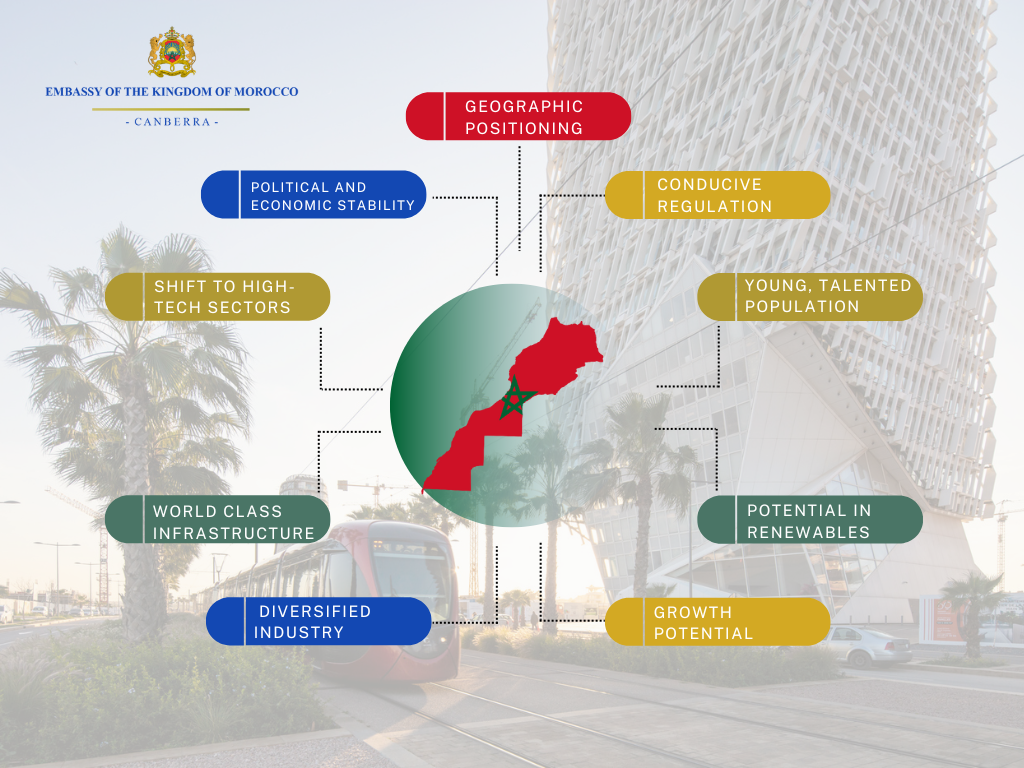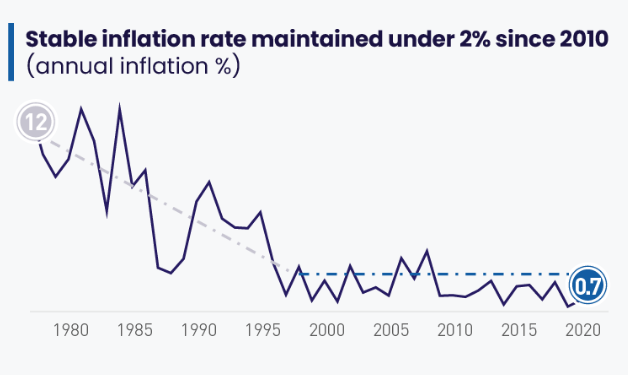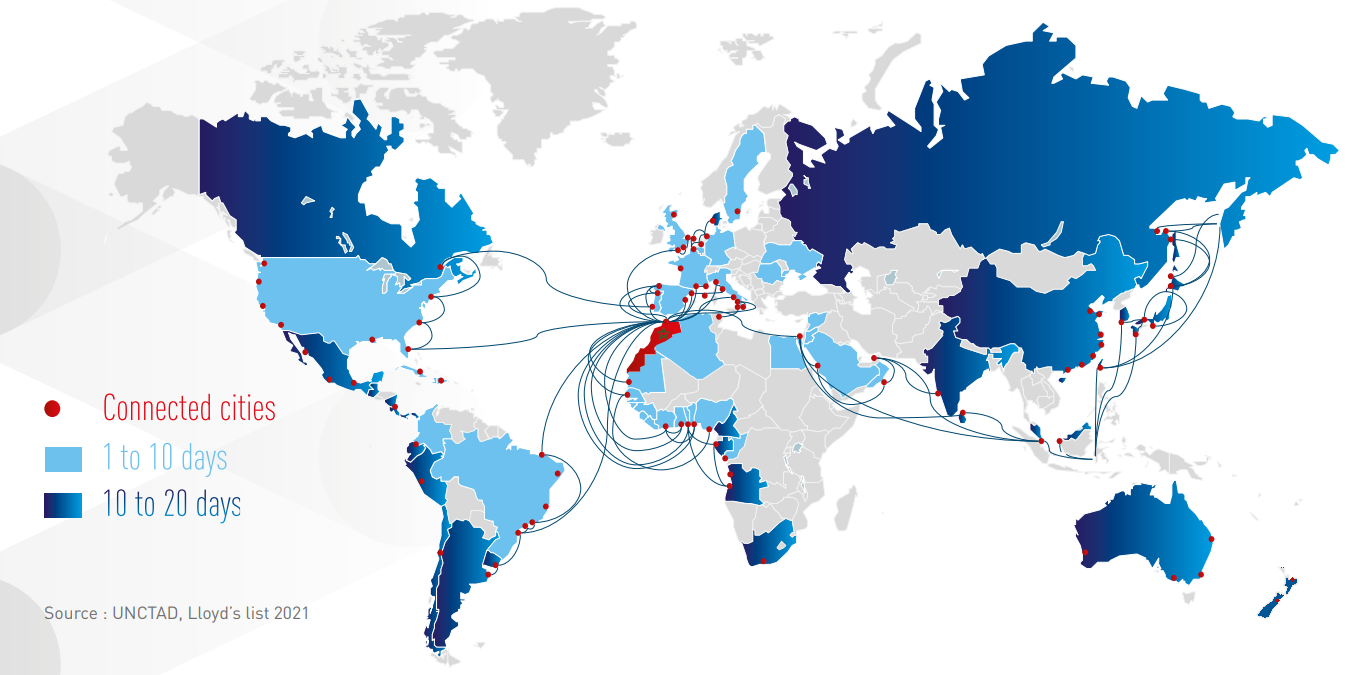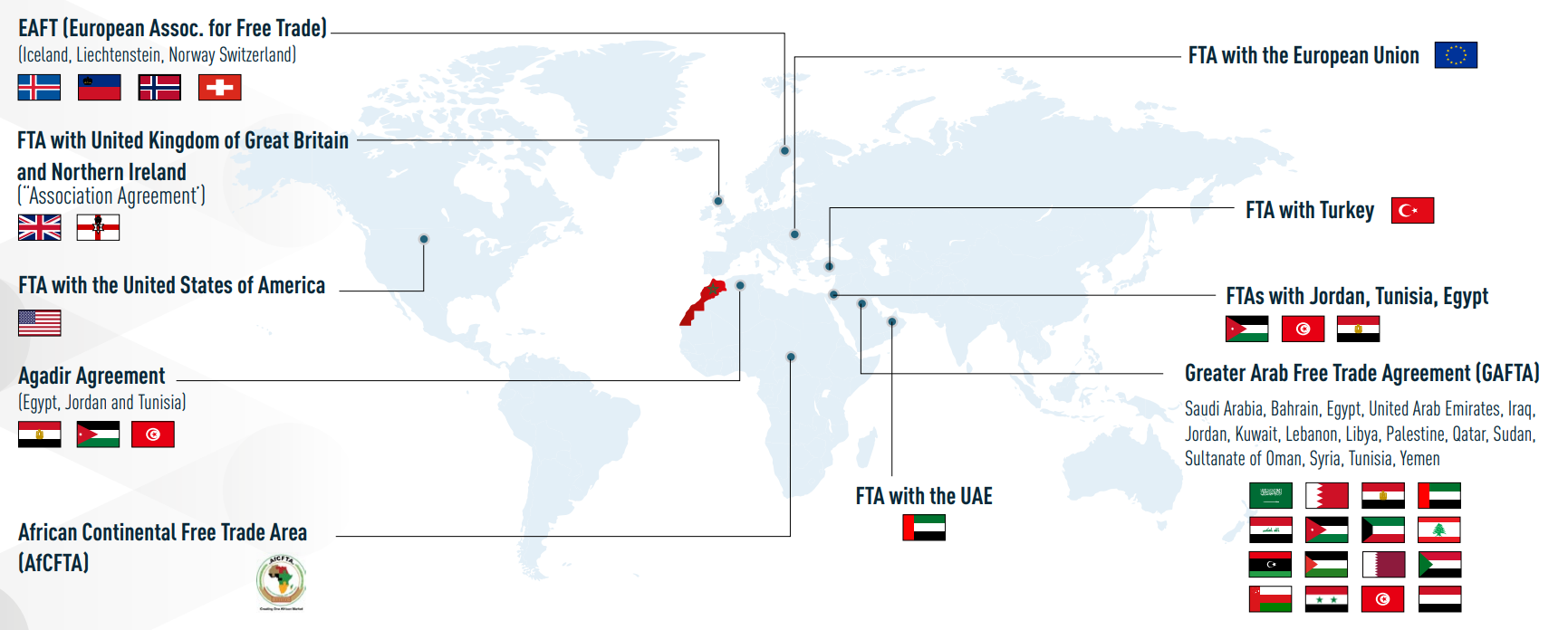Economy and Trade

Morocco's strategic location as a geographical and cultural bridge between Africa and Europe made it a major trade hub in the region. For many decades, Morocco has adopted a policy of economic and financial openness aiming to integrate the Moroccan economy into the global one, and to contribute to the consolidation of a multilateral trading system.
Morocco is considered as a stable country both politically and economnically. For more than two decades, the Kingdom of Morocco has achieved remarkable economic development and transformation under the visionary leadership of His Majesty King Mohammed VI. The Kingdom of Morocco aim for an inclusive and democratic approach, encompassing the different aspects of human development for the construction of a suitable societal model.
This vision has been translated into a deepening of competitive modernization reforms, a consolidation of partnerships with key players of the globalized system, and the progressive diversification of partnerships with emerging and developing countries within the framework of the South-South dimension of Morocco's foreign policy.
Attractive Environment
Morocco has proven to be a reliable business partner with a strong macroeconomic environment shielding its national economy from adverse global conditions. Morocco managed to triple its GDP over the last two decades, with a stable inflation rate under 2% since 2010. In terms of inflation stability Morocco is ranked 1st among 141 countries* (Global Competitiveness Report WEF 2019/* Among the countries ranked first).

(Source: The World Bank / Morocco Now)
Today, Morocco’s economic environment is strong and equipped with modern and conducive legal and regulatory framework, including more than 50 non double taxation and investment protection agreements, no restrictions on capital and free repatriation of profits and capital for non-residents.
Morocco is nowadays:
- 1st Competitive country in North Africa (WEF)
- 2nd Most attractive investment destination in Africa (Rand Merchant Bank, 2021)
- 1st Financial centre in Africa (Global Financial Centres Index, 2020)
The development of world-class infrastructure and economic zones, government subsidies for investors, human capital are key drivers for investment attractivness. Morocco has developed, all over the last decades, a very important network of infrastructures which has made it one of the most attractive destinations for tourism, business and investment in the region.
Connectivity
Morocco is ranked 1st in North Africa in terms of infrastrcuture and digital connectivity.
The Port Tanger Med, extended recently, has become the largest in the Mediterranean. The "Tangier Med port" has tripled its capacity and become the 17th in the world ranking for maritime connectivity. "Tangier Med port" connects the country to 185 ports and 80 countries with a treament capacity of 9 million containers per year. Therefore, export costs in Morocco is the most competitive in the region accounting for 156 $/container.

(Credit: Morocco Now)
Morocco has also delivered megainvestment projects and created conditions for success as illustrated by the country’s automotive ecosystem of 250 companies, the world’s fastest-growing automotive cluster, and an aerospace sector with 140 companies and 20% average yearly growth.
Credible Partnerships on the international level
Morocco is becoming the leading gateway to more than 1.3 billion consumers

(Credit: Morocco Now)
Morocco has set up, during the last decade, a legal framework conducive to developing its commercial relations with some of its potential partners, through the conclusion of free trade agreements either bilaterally or regionally.
Investors are attracted by the country’s stability, the availability of skilled labor at competitive wages, the proximity to European and African Markets, and the access to other markets via free trade agreements. In the same vein, Morocco concluded various Free Trade Agreements all over the last decades, especially with economic world powers such as the European Union, the United States of America (the FTA with US was established in 2004, with bilateral trade accounting to USD 450 million at that time. 15 years later, this figure reached around USD 4 billion) or Türkiye as well as the Agreement of Agadir with Arab Countries.
In terms of triangular cooperation, Morocco is involved with a number of countries to reinforce the South-South Cooperation especially in Africa. In fact, His Majesty King Mohammed VI expressed his intentions to make Morocco a key player in shaping the Africa of the future. Over the years, His Majesty has made more than 50 visits to African countries, signing more than 1,000 agreements across a broad range of sectors placing Morocco as the second-largest investor in Africa (1st in West-Africa), where 90% of the total FDI went to Sub-Saharan Africa between 2010 and 2018.
Energy and Resources
Green growth
Over the past ten years, Morocco transformed itself into a leader in renewable electricity. The avant-garde renewable energy plan positions Morocco as one of the most competitive low-carbon industries in the world. In fact, with $6 billion worth of investments, 4GW of installed capacity (2021), Morocco is the most attractive country in Africa in terms of renewable energy.
As the Kingdom is looking to achieve its target of producing 52 percent of its energy from renewables by 2030, Morocco is also set to become a major exporter of hydrogen and its derivatives. Furthermore, Morocco is expected to have the third lowest green hydrogen production cost in 2050 ranging between roughly $0.7/ kgH2 and $1.4/kgH2 (source: IRENA 2022 report), thanks to its diverse geography and climate providing excellent solar and wind resources that contributes to its renewables potential.
The choice of green hydrogen fully illustrates the Kingdom’s commitment to succeed in its energy transition and to establish its position on the international scene as a pioneer in renewable energies.
Resources
Mining in Morocco is an essential component in the economic and social development of the Kingdom. It plays an important role in the national economy. Morocco is one of the world’s leading producers of high-quality phosphate. The kingdom possesses just over 70% of the world’s total phosphate reserves and remains the leading global exporter.
Over the past several years a bold government strategy has been under way with the aim of increasing production and export volumes in mining outside of phosphates. In 2021, Morocco has updated its strategy for the development of the national mining sector based on a global and pragmatic approach aimed at the development of a competitive mining sector by 2030 working for integrated industrialisation and sustainable growth.
So far, Morocco has been successful in diversifying away from phosphates and increasing foreign investment in the nascent segments of mining. Morocco is home to a range of metals and minerals (silver, lead, zinc, cobalt, copper, fluoride, manganese, baryte, etc). Hence, the Kingdom ranks 1st in Africa for silver exploitation; 7th worldwide and 2nd in Africa for fluorite; 3rd worldwide and 1st in Africa for barite; and 11th worldwide and 3rd in Africa for cobalt.
In 2022, the Canadian Think Tank “Fraser Institute” ranked Morocco as the best place for mining investment in Africa, and the 8th best in the world, while in terms of policy, Morocco was ranked the second-highest jurisdiction globally.
New Development Model
His Majesty King Mohammed VI launched an initiative called the “New Development Model,” which defines the strategic direction of Morocco’s development for a productive and diversified economy that will create added value for the country and deliver quality jobs by 2035.
To achieve this ambition, the new development model focuses on 5 major objectives, namely:
- A prosperous Morocco, creating wealth and quality jobs to match its potential;
- A skilled Morocco, where all citizens have the capacities and well-being enabling them to take charge of their lives and contribute to value creation;
- An inclusive Morocco, offering opportunities and protection to all, where social ties are consolidated;
- A sustainable Morocco, where resources are preserved across all territories;
- A bold Morocco, as a regional leader in promising areas such as: research-training-action, low-cost and low-carbon energy, digital technology, capital markets and the Made in Morocco that is fully integrated to global value chains.